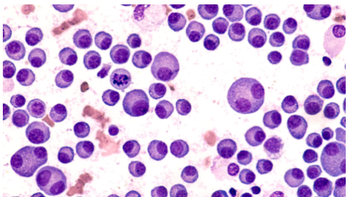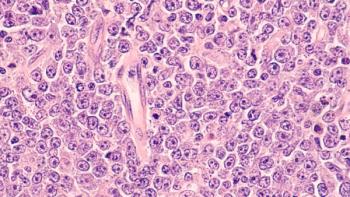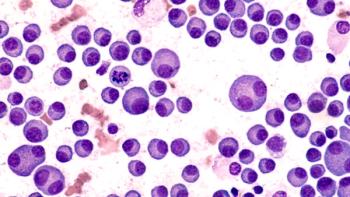
Ruben A. Mesa, MD, FACP, discusses the results of the SIMPLIFY-1 and MOMENTUM trials and how the data led to the approval of momelotinib to treat intermediate or high-risk myelofibrosis in adult patients with anemia.

Ruben A. Mesa, MD, FACP, discusses the results of the SIMPLIFY-1 and MOMENTUM trials and how the data led to the approval of momelotinib to treat intermediate or high-risk myelofibrosis in adult patients with anemia.

Lutetium Lu177 dotatate demonstrated significant and clinically meaningful progression-free survival for those with SSTR-positive and inoperable midgut neuroendocrine tumor.

The combined enfortumab vedotin-ejfv and pembrolizumab treatment is recommended for patients with locally advanced or metastatic urothelial cancer who are ineligible for cisplatin-containing therapy.

Bosutinib (Bosulif) is indicated to treat pediatric patients with Philadelphia chromosome–positive chronic-phase chronic myelogenous leukemia that is newly diagnosed, resistant, or intolerant to previous therapy.

Investigators reported that enfortumab vedotin-ejfv (Padcev; Astella Pharma Inc, Seagen Inc) in combination with pembrolizumab (Keytruda; Merck & Co Inc) met the dual primary endpoints of overall survival and progression-free survival in patients with previously untreated locally advanced or metastatic urothelial cancer.

Most patients had improved clinical response within 90 days of receiving the dendritic cell vaccine and ASCT.

As the resident medication experts, pharmacists are qualified to answer any medication-related questions and conduct data analyses.

Datopotamab deruxtecan (Dato-DXd; AstraZeneca, Daiichi Sankyo) also demonstrated improved overall survival compared to chemotherapy.

Nivolumab has also demonstrated efficacy in immunotherapy-based combinations for the treatment of certain types of melanoma and bladder cancers.

Chemotherapy, medication for attention deficit/hyperactivity disorder, glucagon-like peptide-1 agonists for weight loss and diabetes, and local anesthetics were among the drugs most affected by shortages.

Axicabtagene ciloleucel achieved a complete metabolic response of 71% at 3 months versus 12% expected with standard of care among transplant ineligible patients with relapsed/refractory large B-cell lymphoma.

The approval of pembrolizumab with brachytherapy could aid individuals who were newly diagnosed with progressive cervical cancer.

Christina Madison, PharmD, FCCP, AAHIVP, sat down with Ryan Haumschild, PharmD, MS, MBA, to discuss current issues in oncology.

The sNDA is based on data that evaluated belzutifan (Welireg; Merck) compared to everolimus (Afinitor; Novartis) for the treatment of advanced renal cell carcinoma.

Microbubble cell separation can make next generation treatments, such as CAR T-cell therapy, more accessible.

In many countries, trastuzumab deruxtecan is the only HER2-targeted therapy approved for patients with this HER2–mutant metastatic non-small cell lung cancer.

Moving cannabis to Schedule 3 will make it easier to research, resulting in the development and creation of new cannabinoid-based pharmaceuticals, with notable potential in oncology.

Pharmacists can help to usher in a new era of patient-centered end-of-life care.

Moderna has advanced 6 programs into late-stage development, including for respiratory conditions, latent and other viruses, oncology, and rare diseases.

Combining strong evidence-based recommendations with caring, compassionate, and frequent counseling opportunities hopefully will increase vaccine acceptance and ultimately reduce the incidence of HPV and associated cancers among our patients.

Improved classification of different lymphoma types can improve the potential of targeted therapies and help predict patient responses.

Most patients with myelofibrosis will develop anemia over the course of the disease, with more than 30% discontinuing treatment as a result.

Bispecific antibodies have 2 distinct binding domains, which interact with either CD3 on T cells or a tumor-associated antigen on the tumor cell surface.

Clinicians raise concerns about immunogenicity, product quality, and reimbursement for biosimilars.

The use of base editing to generate universal, off-the-shelf CAR T cells is a promising approach for relapsed leukemia, with potential implications for the future of gene therapy.

Investigators found an approximately 23% decrease in overall cancer incidence in April 2020, specifically for breast, colon, rectal, head and neck cancers, as well as melanoma and endocrine cancer diagnoses.

Experts agreed that it was appropriate for patients who use methamphetamine or cocaine to continue opioid use if clinician monitoring was increased and tapering was avoided.

AACR has urged Congress to provide billions more in funding for cancer research, prevention efforts, and expedited review of cancer-related medical products.

Bispecific antibodies have offered a new treatment approach in relapsed/refractory multiple myeloma, with promising results in preclinical studies for multiple cancers and hematological malignancies.

Sotorasib (Lumakras) plus carboplatin and pemetrexed shows promise in the first line treatment of advanced non–small cell lung cancer.